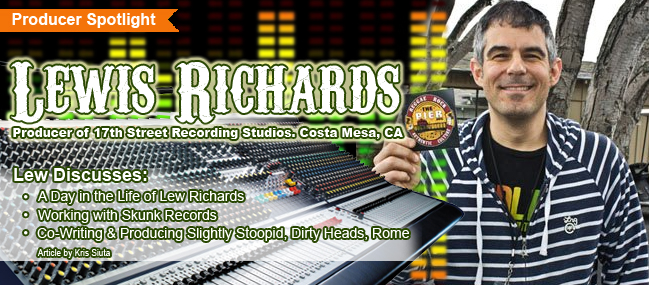
When the words “reggae-rock” or “reggae” are spoken, what comes to your mind? Maybe the bass lines and catchy melodies of legends Bob Marley and The Wailers come to mind? Or maybe the genre blending work of contemporaries Sublime, Slightly Stoopid, 311 or SOJA fill your head. But, what about the people and places behind the music, like the sound engineers, mixers, producers and studios? This is where you can fill in another name synonymous with “reggae-rock”—namely producer/engineer/musician/songwriter, Lewis “Lew” Richards and 17th Street Recording Studios out of Costa Mesa, CA.
The Beginnings: A Dream to Make Good Music
Although Richards has developed a much-deserved reputation in the music business, making music was not always his dream. Richards shares, “When I was younger, I actually wanted to make movies. I was going to go to film school, and then music kind of pulled me back in.” 
Starting from a young age, music was always a big part of Richards’ life. He started by playing the trumpet and later switched to guitar. “I played guitar for a really long time to try and get really good. I just wanted to have a good sound when I was playing,” says Richards. After guitar, Richards switched instruments two more times by sitting down at the piano and picking up the bass.
Like many music lovers over the past five decades, Richards started as a fan of The Beatles. He would listen to the music legends everyday on his way to school, and on his way home. “It was The Beatles all the time for me. I had all of those songs in my head for a long time. That always drove me to make music like that—good music. I just totally wanted to do what The Beatles did.”
For many, to love The Beatles is to love music. Likewise, to love Bob Marley is to love music. Albums like, “Sergeant Peppers,” “Rubber Sole,” “A Hard Day’s Night,” along with “Burin’,” “Natty Dread” and “Exodus” defined, and inspired, generations. For Richards, these concepts couldn’t be simpler. Richards explains, “Bob Marley’s music is universal music just like The Beatles. There are really only two types of music, good and bad. I think everyone could say that both The Beatles and Bob Marley are a big part of the good music, rather than the bad side.”
Laying the Foundation: 17th Street Recording Studio
Richards’ journey in the Southern California music scene began as a musician. Richards’ band “Jesus Wore Dickies” drew the attention of some of the biggest names on the reggae-rock circuit at the time. These bands would later help to pave the way for his success as a producer. “…all the guys in Long Beach Dub liked our music. It wasn’t so much the Long Beach Dub All-Stars albums, but all of the musicians that made up the band,” says Richards. In the early days of the genre, Richards worked closely with Eric Wilson, Bud Gaugh, Marshall Goodman, Opie Ortiz and Jack Maness on their solo projects.
From these seemingly humble beginnings, Richards has worked tirelessly to make a name for himself in the  music business. He has worked in varying capacities with the likes of Slightly Stoopid, The Dirty Heads, Rome, Micah Brown, and music legends Sublime, The Police front man Sting and R&B diva Mary J. Blige.
music business. He has worked in varying capacities with the likes of Slightly Stoopid, The Dirty Heads, Rome, Micah Brown, and music legends Sublime, The Police front man Sting and R&B diva Mary J. Blige.
As Lew Richards said, “You can basically describe Sublime as the American version of Bob Marley. Unfortunately, I came in later, after Bradley had already passed. I first started working for Skunk Records and Michael “Miguel” Happoldt. I was working with Slightly Stoopid on their early records. I was an assistant to Miguel for awhile…I would just be talking about computers nonstop, and he and I worked on computers together once ProTools came out. I want to say it was 1998 or ’97, somewhere around there.”
Now, with over a decade of being a producer, engineer, songwriter and musician in Southern California, Richards has established himself as the “go-to” producer for reggae-rock music. In the Jesus Wore Dickies days, Richards had a studio in Long Beach, CA, “we were right in the heart of Long Beach and Ras 1, Jack and Opie would always come over to jam and write music. It was a lot of messing around, you know?”
Out of these jam sessions 17th Street Recording Studios was born, opening its doors in 2001. “At 17th Street, we have tons of musicians coming in and out all the time. We still have lots of fun together, but there are new bands coming through every week.”
In addition to the impressive and ever-expending list of musicians to grace 17th Street Recording Studio, the studio proudly displays a piece of music history. The artwork from Sublime’s self-titled album graces the studio wall. Although the artwork doesn’t represent Richards’ contributions to the album—given he did not produce or mix the album—it represents a token of appreciation from one of Sublime’s founders. “Miguel (Happoldt) gave that to me when we were working together. He hooked me up with the Lou Dog plaque too. I worked with all those guys on the technical side when we did the mastering for the Sublime ‘Everything Under The Sun’ box set. So, I was just around during that time and Miguel was nice enough to give me that.” This gift by Sublime signifies, among many things, a token of appreciation and respect for Richards’ work and contribution to the music.
The Craft: Producing, Writing and Recording
Working with new bands and musicians is all part of the fun for Richards. “One thing about recording is (that) every single studio session is different. No matter what, it is going to be totally different with each band. Each time someone comes into the studio, we start fresh.”
As a producer Richards works to coach and mentor younger bands to find the sometimes elusive ‘right sound.’ “I try to guide these guys and help them as much as I can. You are not going to write a hit song every time you record. Everything has to be just right for it to happen,” says Richards. But for those bands lucky enough to have that ‘just right moment,’ Richards knows it immediately. 
“Obviously, when we heard ‘Lay Me Down’ with The Dirty Heads and Rome killing it—that was a hit right in the moment.” Richards continues “…that song we knew was going to be pretty big. It had all the right ingredients to reach that success that it did. That one definitely sticks out for me.”
Richards considers himself a “hands-on” producer, especially when it comes to writing and recording. For Richards, the studio process is very much a “co-collaborator process.” “I am a co-writer so I am always writing, whether it is for me or for another band. For Rome, we came up with ‘You Better Listen’ together in the studio. I came up with the chord structure, and he was jamming over those chords.”
Richards often finds himself infused on the song writing and creative process. “Same with The Dirty Heads, we write a lot together too. (In the studio) It is a lot more like a co-writing collaboration that I have with the bands.” But, when it’s good—it’s good. “Don’t get me wrong; if a band comes in with a song and it is really good, then I will record it,” laughs Richards.
Richards is always excited to work with new collaborators, especially ones as talented as Matisyahu. The song, “Dance All Night” has become one of the strongest tracks from Dirty Heads “Cabin By The Sea” album. It was Rome who came up with the hook for the song, which was later completed by Richards and Jared Watson. But, the “cherry-on-top” was guest vocalist Matisyahu. “It was cool to have Matisyahu in the studio to write and collaborate with him. He is a really talented writer and singer, and was really cool to work on that song with him. He just went right to work on his part and was really professional. I hope we get to work together again!”
Success: Hard Work Paying Off
While there is no way to know whether or not Richards could have experienced the same success in the  movie business, it is quite possible that if not for The Beatles and Bob Marley, we may be watching a Richards’ produced blockbuster instead of dialing-in Slightly Stoopid or The Dirty Heads on our iPods.
movie business, it is quite possible that if not for The Beatles and Bob Marley, we may be watching a Richards’ produced blockbuster instead of dialing-in Slightly Stoopid or The Dirty Heads on our iPods.
However, what is clear is that Richards’ ability to create music has further expanded and advanced the reggae-rock genre as a whole. And, luckily, the successes of the bands with which Richards records and writes have been shared with him. Recently the Orange County Music Awards honored Richards and 17th Street Recording Studios as “Best Record Label of 2012″.
Like most of us, Richards wakes up day-after-day and goes to work. However, there are some not-so-subtle differences for Richards. He doesn’t report to a typical office job that is eerily similar to the cubicles on Office Space. Richards’ concept of paperwork is most likely different than those TPS reports.
For Richards, he gets to report to his studio, where his “cubicle” is filled with the same instruments and gear The Beatles used to make their sound. And Richards’ concept of “paperwork” is writing catchy melodies and collaborating on hit songs with some of industries best talent. With recent awards and accolades only reaffirming what many already knew, Richards has stayed true to his original vision of make good music.
“I am just trying to stay good at my craft. I think we all try to get better every day. In music it is the same situation. If I am honored in any way, I will gladly take it,” reflects Richards.
17th Street Recording Studio Links:
17th Street Recording Website
17th Street Recording Facebook
Article By: Kris Siuta
Photos By: Amanda Zancanella
Watch: Micah Brown – “All That You Need” feat. Essel & Matt Liufao (Seedless)
Watch: Kat – “Lucky One” feat. Lewis Richards

